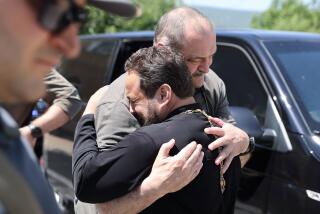Uzbekistan Bombs, Clashes Claim 18
- Share via
MOSCOW — A series of explosions and clashes between insurgents and police left at least 18 people dead and dozens wounded in the Central Asian nation of Uzbekistan, authorities said Monday.
Two blasts Monday in the capital, Tashkent, claimed the lives of a suspected suicide bomber and two victims, and an explosion Sunday night in the Bukhara region took nine lives, Uzbek Interior Ministry spokesman Aziz Ernazarov said by telephone. Six policemen also were killed Sunday night in a clash with gunmen believed to be militants, he said.
In further violence this morning, an explosion near a checkpoint outside Tashkent and a shootout between police and alleged terrorists left several people injured, Russian media reported.
Some reports indicated that those killed in the Bukhara region, about 300 miles southwest of the capital, were militants blown up by their own explosives, but Ernazarov said he could not confirm that.
The violence reflects tensions in a country that has strongly supported U.S. anti-terrorism efforts in the region. American forces are stationed at the Karshi Khanabad air base, from which special operations troops and others have launched missions into Afghanistan.
Domestic critics and international human rights activists have charged that the Uzbek government suppressed political opposition in the name of fighting terrorists, and one Uzbek activist suggested Monday that the blasts might have been carried out by security forces in a bid to distract attention from demands for reform.
This week’s explosions were reminiscent of a series of blasts in Tashkent in February 1999. At least five car bombs went off at nearly the same time outside government buildings, killing at least 16 people. Uzbek President Islam Karimov said at the time that those blasts were an attempt to assassinate him, and he intensified his campaign against political opponents and Muslim fundamentalists.
In describing the Monday clashes, Ernazarov said, “There were two explosions in Tashkent this morning. The first one happened in the old city in Chorsu market. We haven’t established it for sure yet because whoever set off the bomb was exploded along with it, but we think based on the findings that it was a woman suicide bomber.”
Two people besides the purported bomber died in that blast, he said.
About an hour later, there was an explosion near an Islamic school in the center of the city, but no one was killed, he said.
The Karimov government blamed Islamic extremists in the bombings, citing a banned group called Hizb ut-Tahrir as a possible perpetrator. The group denied responsibility.
In Washington, State Department spokesman Richard Boucher said the attacks “are yet another example of the importance of continuing cooperation against those who would stop at nothing to achieve their misguided goals.”
Karimov spoke on state-run television.
“If you analyze them, it becomes evident they were planned well ahead and very thoroughly, and also with help from extremist forces abroad,” the president said in remarks also carried on Russian television.
But Talib Yakubov, chairman of the Human Rights Society of Uzbekistan, said Monday that the blasts probably were the work of Uzbek secret services, designed to give the country an excuse not to meet human rights requirements imposed last year by the European Bank for Reconstruction and Development as a condition for loans.
“Among the demands was a requirement that Uzbekistan should admit that torture took place in its prisons and that steps should be taken to stop it,” he said. “Nothing has been admitted, and no steps have been taken to eradicate that evil.”
Another demand was that various political parties and organizations should be permitted to be registered, Yakubov said. “It is not happening. Our organization has been struggling for six years to get officially registered -- to no avail.
“Uzbekistan authorities decided to demonstrate to the West that the front line of the war against international terrorism is passing through Uzbekistan, and that Uzbekistan authorities are so busy fighting it that they have little time for such trifles as human rights and political freedoms. It is a very blunt and obvious tactical move.”
Uzbek Foreign Minister Sadyk Safayev, speaking at a news conference in Tashkent, cast the incidents as part of a global threat.
“Unfortunately, we have all been recently witnessing a step-up in global terrorism,” he said in remarks televised in Russia. “We see manifestations of these activities in many parts of the planet. And to all appearances, they are links of the same chain.”
*
Times staff writer Sergei L. Loiko contributed to this report.
More to Read
Sign up for Essential California
The most important California stories and recommendations in your inbox every morning.
You may occasionally receive promotional content from the Los Angeles Times.










